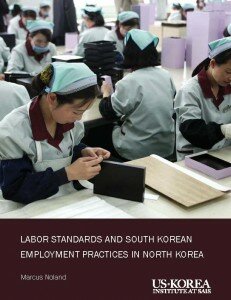 By 2012, South Korean firms employed more than 50,000 workers in North Korea. Survey data indicate that the North Korean government has successfully circumscribed exposure of North Korean citizens both to South Koreans and to more market-oriented economic practices. South Korean investment in North Korea may well be beneficial both for the firms and the workers involved, but evidence of the sort of broader spillovers that proponents of engagement sometimes assert is not evident.
By 2012, South Korean firms employed more than 50,000 workers in North Korea. Survey data indicate that the North Korean government has successfully circumscribed exposure of North Korean citizens both to South Koreans and to more market-oriented economic practices. South Korean investment in North Korea may well be beneficial both for the firms and the workers involved, but evidence of the sort of broader spillovers that proponents of engagement sometimes assert is not evident.
In the new USKI report, “Labor Standards and South Korean Employment Practices in North Korea,” Marcus Noland, Executive Vice President and Director of Studies at the Peterson Institute for International Economics and Adjunct Professor of Korea Studies at Johns Hopkins SAIS, examines key questions about the nature of South Korean employment practices in North Korea both inside and outside the Kaesong Industrial Complex and whether this interaction is likely to encourage North Korean economic transition. He also examines the international legal obligations of both Koreas to implement fair and equitable labor standards and suggests ways to encourage better labor practices by South Korean government and firms in North Korea.
Download the USKI Report, “Labor Standards and South Korean Employment Practices in North Korea,” by Marcus Noland.
Video of the report launch event featuring Marcus Noland and Keith Krulak, can viewed here:
ABOUT THE AUTHOR
Marcus Noland is the Executive Vice President and Director of Studies of the Peterson Institute for International Economics (PIIE). He has been associated with the Institute since 1985. He is currently a senior fellow at PIIE and the East-West Center. He was previously a senior economist at the Council of Economic Advisers in the Executive Office of the President of the United States.
His research addresses a wide range of topics at the interstice of economics, political science, and international relations. His areas of geographical knowledge and interest include Asia and Africa where he has lived and worked, and the Middle East. In the past he has written extensively on the economies of Japan, Korea, and China, and is unique among American economists in having devoted serious scholarly effort to the problems of North Korea and the prospects for Korean unification. He won the 2000–01 Ohira Memorial Award for his book, Avoiding the Apocalypse: The Future of the Two Koreas. Noland received his B.A. from Swarthmore College and Ph.D. from Johns Hopkins University.



